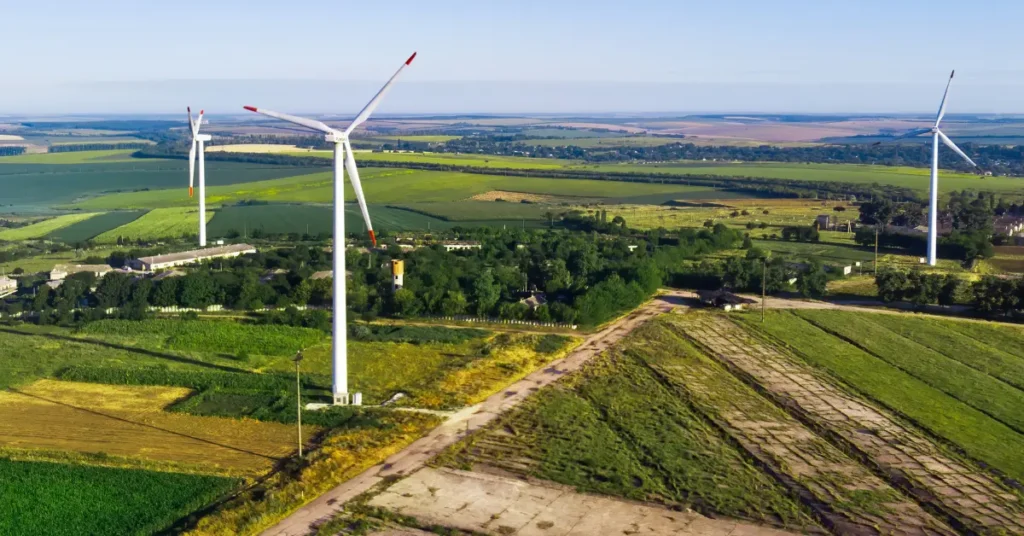Germany’s renewable energy sector produced an impressive 121.5 billion kilowatt hours (kWh) in Q1 2024. This represents an 11.6% increase compared to the same period last year.
The surge in renewable energy output underscores Germany’s commitment to reducing its carbon footprint and advancing towards a cleaner, more sustainable energy future.
Wind, solar, and other renewable sources have played a crucial role in this achievement. The increased efficiency and capacity of renewable energy infrastructure have been instrumental in driving this growth.
As Germany continues to invest in renewable technologies, the potential for even higher records in the future seems promising.
Decline in Fossil Fuel Dependence
Simultaneously, Germany has witnessed a significant decline in the output from fossil-fuel power sources. In Q1 2024, fossil fuels accounted for only 41.6% of the total electricity production, a 25.4% decrease from the previous year.
This reduction highlights the shifting energy landscape in Germany, where renewable energy is steadily overtaking traditional fossil fuel sources.

The decrease in fossil fuel usage is a positive step towards reducing greenhouse gas emissions and combating climate change. Germany’s strategic focus on renewable energy not only supports environmental goals but also enhances energy security and sustainability.
Looking Ahead
Germany’s record-breaking renewable energy generation in Q1 2024 sets a strong precedent for the rest of the year. As the country continues to prioritize renewable energy investments and policies, the transition to a greener energy system is likely to accelerate.
This achievement serves as an inspiration for other nations striving to increase their renewable energy share. By demonstrating the feasibility and benefits of a robust renewable energy sector, Germany is paving the way for a more sustainable global energy future.
What does this mean for energy generation in Germany?
Germany’s Q1 2024 renewable energy record is a testament to the country’s dedication to sustainable development and environmental stewardship. With renewables supplying over half of the total electricity generation, Germany is leading by example in the global effort to transition to cleaner energy sources.
The continued growth and success of the renewable energy sector will be crucial in achieving long-term climate goals and ensuring a sustainable future for all.
This is a record-breaking moment for renewable energy in Germany.
A surge in clean energy output that sets a new benchmark.
Here’s how they achieved it ↓
Germany’s renewable energy sector produced an impressive 121.5 billion kilowatt hours (kWh) in Q1 2024. This represents an 11.6% increase compared to the same period last year.
The surge in renewable energy output underscores Germany’s commitment to reducing its carbon footprint and advancing towards a cleaner, more sustainable energy future.
Wind, solar, and other renewable sources have played a crucial role in this achievement. The increased efficiency and capacity of renewable energy infrastructure have been instrumental in driving this growth.
As Germany continues to invest in renewable technologies, the potential for even higher records in the future seems promising.
Simultaneously, Germany has witnessed a significant decline in the output from fossil-fuel power sources. In Q1 2024, fossil fuels accounted for only 41.6% of the total electricity production, a 25.4% decrease from the previous year.
This reduction highlights the shifting energy landscape in Germany, where renewable energy is steadily overtaking traditional fossil fuel sources.
The decrease in fossil fuel usage is a positive step towards reducing greenhouse gas emissions and combating climate change. Germany’s strategic focus on renewable energy not only supports environmental goals but also enhances energy security and sustainability.
Germany’s record-breaking renewable energy generation in Q1 2024 sets a strong precedent for the rest of the year. As the country continues to prioritize renewable energy investments and policies, the transition to a greener energy system is likely to accelerate.
This achievement serves as an inspiration for other nations striving to increase their renewable energy share. By demonstrating the feasibility and benefits of a robust renewable energy sector, Germany is paving the way for a more sustainable global energy future.





